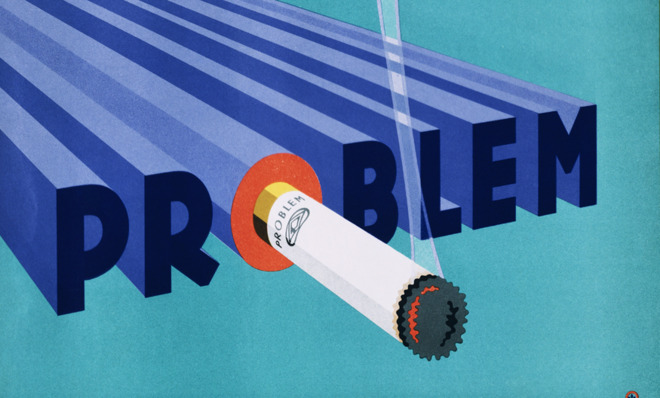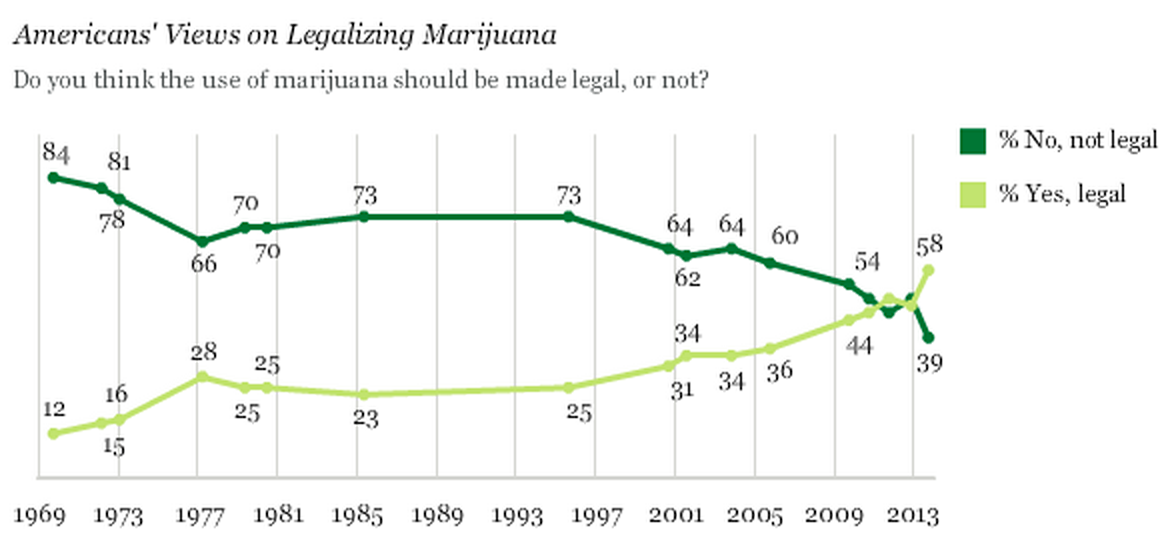Is marijuana the future of Big Tobacco?
As tobacco consumption declines, the popularity of marijuana just gets higher

A free daily email with the biggest news stories of the day – and the best features from TheWeek.com
You are now subscribed
Your newsletter sign-up was successful
Americans are smoking much less tobacco than they once did. In fact, data from Gallup show that the proportion of Americans who smoke has roughly halved since it peaked in the 1950s:

[Gallup]
As you can see, it has been a long, drawn-out decline. To date, Big Tobacco has shrugged off this trend line with strong growth in developing countries, including India, Russia, and especially China, which now has more than 350 million smokers. But in the longer run, the declining numbers of smokers in the United States is a damaging development for Big Tobacco and a presage of things to come elsewhere.
The Week
Escape your echo chamber. Get the facts behind the news, plus analysis from multiple perspectives.

Sign up for The Week's Free Newsletters
From our morning news briefing to a weekly Good News Newsletter, get the best of The Week delivered directly to your inbox.
From our morning news briefing to a weekly Good News Newsletter, get the best of The Week delivered directly to your inbox.
Logically, why would people choose a vice that is widely known to be carcinogenic when there are other mild and less-addictive stimulants — notably coffee and tea — that don't have the cancer-causing effects of tobacco? Sure, Big Tobacco — through clever advertising and product placement — has over the years made smoking look cool, which has kept their business going despite the fact that it was literally killing its consumers. But gradually, generation by generation, the popularity of smoking has melted away in the U.S.
And while tobacco has balanced that decline with a surge of sales in developing countries, it can't rely on that growth forever. The cracks are already beginning to show, in fact. China, for instance, is now moving to ban smoking in public. As developing countries begin to treat smoking as a public health menace, a decline in tobacco consumption, like America's, will almost invariably follow.
So what's Big Tobacco — facing a future of government trying to regulate it out of existence, declining global tobacco usage rates, and the prospect of more lawsuits — to do? Sell e-cigarettes? E-cigarettes are addictive and contain carcinogenic chemicals, too, although at much lower levels than cigarettes. Get out of the recreational drug industry altogether? Maybe — considering tobacco killed 100 million people in the 20th century, that might be a good idea. But another option to avoid fading away is to get into the ascendant marijuana industry.
While the popularity of tobacco has shot downward, the popularity of marijuana is shooting upward, following medical legalization in 20 states and recreational legalization in Colorado and Washington. A majority of Americans — a staggering 58 percent — now believe pot should be legalized:
A free daily email with the biggest news stories of the day – and the best features from TheWeek.com

[Gallup]
And marijuana usage is rising, too. Recent data from Pew shows that 12 percent of Americans have used marijuana in the last year, up from 6.9 percent in 2010 and 6.8 percent in 2007. That's impressive growth, and with more states, including New York, Tennessee, and Arizona, considering legalization laws, this growth is likely to continue, creating new business opportunities.
Of course, Big Tobacco has thus far stayed out, not least because marijuana remains illegal under federal law, while the highly addictive and cancer-causing tobacco is not.
In 2012, Bill Phelps, a spokesman for Philip Morris USA, the maker of Marlboro, was not forthcoming when asked about the future intentions of the nation's largest tobacco company, telling CBS: "Tobacco companies are in the business of manufacturing and marketing tobacco products."
And Bryan Hatchell, a spokesman for the second-largest cigarette maker, Reynolds American Inc., maker of Camel and Pall Mall told CBS: "Reynolds American has no plans to produce or market marijuana products in either of those states," He added: "It's not part of our strategy."
Now, with legal marijuana already a $1.43 billion market and growing at a monster rate of 64 percent per year, the incentives are clearly growing, especially with the U.S. government increasingly turning a blind eye when state laws conflict with federal ones. President Obama, in fact, seems to be warming to the idea of full legalization, claiming marijuana is no more harmful than alcohol, a claim drug harm assessments support.
Of course, there are still risks. Marijuana consumption has been linked to memory loss and the development of schizophrenia, although other research disputes the schizophrenia link. Would Big Tobacco want to risk paying out millions to schizophrenia sufferers? Getting into the marijuana industry carries that risk.
And there is already another debate over whether smoking marijuana causes cancer — the evidence, so far, is inconclusive. Marijuana smoke contains some of the same chemicals in tobacco smoke, including benzyprene, which is known to be carcinogenic.
But multiple studies have shown that both the hallucinogenic THC compound, as well as other cannabinoid compounds in marijuana, have anti-cancer properties. And marijuana users do not have to smoke it to experience its effects — it can also be vaporized, eaten, or drunk as a liquid.
Is marijuana the future of the tobacco industry? I don't know. If governments continue to treat smoking as a public health menace, then the tobacco industry may not have a future at all. The costs to public health from smoking have been simply enormous — $132.5 billion in the United States alone. But if the popularity of marijuana continues to rise, that could give Big Tobacco a way out of a business in decline, and into one that is growing.
Editor's note: This article originally overstated the potential cancer-causing effects of e-cigarettes. It has since been corrected.
John Aziz is the economics and business correspondent at TheWeek.com. He is also an associate editor at Pieria.co.uk. Previously his work has appeared on Business Insider, Zero Hedge, and Noahpinion.